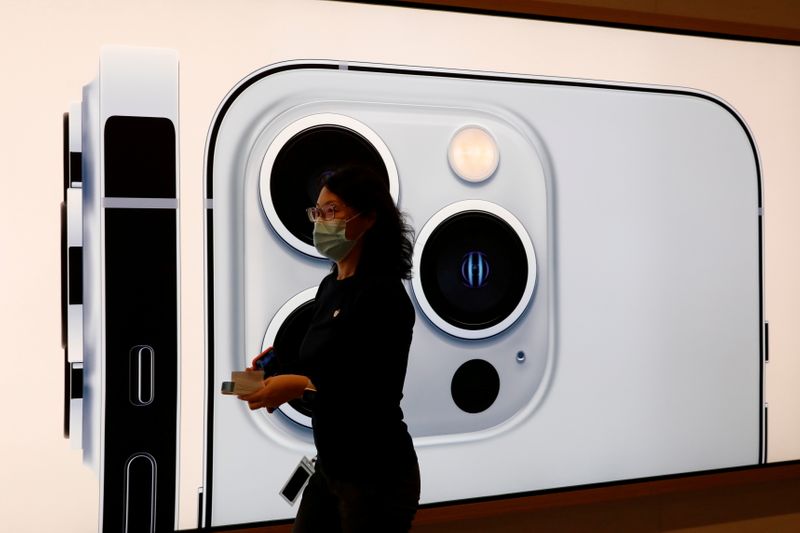This post was originally published on this site
https://d1-invdn-com.investing.com/content/picf2ffca5ac64ee896c0a9413a21e80f41.jpg
AirPods maker GoerTek Inc. is one of the many manufacturers exploring locations beyond its native China, which today cranks out the bulk of the world’s gadgets from iPhones to PlayStations. It’s investing an initial $280 million in a new Vietnam plant while considering an India expansion, Deputy Chairman Kazuyoshi Yoshinaga said in an interview. US tech companies in particular have been pushing hard for manufacturers like GoerTek to explore alternative locations, said the executive, who oversees GoerTek’s Vietnamese operations from northern Bac Ninh province.
“Starting from last month, so many people from the client side are visiting us almost every day,” Yoshinaga said from his offices at GoerTek’s sprawling industrial complex north of Hanoi. The topic that dominates discussions: “When can you move out?”
The expanding conflict between the US and China, which began with a trade war but has since expanded to encompass sweeping bans on the exchange of chips and capital, is spurring a rethink of the electronics industry’s decades-old supply chain. The world’s reliance on the Asian nation became starkly clear during the Covid Zero years, when Beijing’s restrictions choked off the supply of everything from phones to cars.
Apple’s suppliers rarely comment on its thinking, in part because of the US company’s famous insistence on secrecy across its global supply chain.
The iPhone maker has kept mum on whether it plans to diversify out of China, which would entail revamping a model Chief Executive Officer Tim Cook pioneered under Steve Jobs. The US giant has been careful to avoid suggestions it might reduce its investment in China, where it’s built an ecosystem centered on companies such as GoerTek and Foxconn Technology Group, which collectively employ millions.
Behind the scenes, 9 out of 10 of Apple’s most important suppliers may be preparing large-scale moves to countries like India, which is dangling incentives to drive Narendra Modi’s Make in India initiative. Bloomberg Intelligence estimates it could take eight years to move just 10% of Apple’s capacity outside of China.
The GoerTek executive argues it’ll be far quicker.
Most Chinese tech manufacturers are experiencing the same pressure. “I would say currently 90% of them, they’re looking at that,” he added. “It’s the brand companies’ decisions.”
India is high on clients’ wish-lists — a reflection of its potential both as a market and a manufacturing base.
“We get requests from our clients almost every month. ‘Do you have any plans to expand to India?’” Yoshinaga said. “If they decide to build up the production lines in India, we may have to think about it seriously. Currently we are focusing on developing our Vietnam production facilities.”
Vietnam for now is the company’s sole manufacturing site outside of China. The envisioned new 62-hectare complex in Bac Ninh will make products for major US brands and is expected to be operational within a year, Yoshinaga told Bloomberg News. That investment will add to the $1.06 billion of commitments that GoerTek’s made in Bac Ninh and the north-central province of Nghe An, he added.
GoerTek, which also plans to manufacture virtual reality headsets in Vietnam from 2024, expects the Southeast Asian country to produce more than half of its global revenues in three years, up from one-third now, Yoshinaga said. The company is also asking its own suppliers to scout northern Vietnam for new factories, he said. It makes Quest virtual reality headsets for Meta Platforms Inc (NASDAQ:META) and Sony (NYSE:SONY) devices.
GoerTek set up operations in Vietnam a decade ago to make acoustic products at the request of Samsung Electronics (OTC:SSNLF), he said. The supplier now operates eight plants in the country, and expects to double its local workforce to 40,000 as soon as May to ramp up for Christmas, Yoshinaga said.
Vietnam’s proximity to China, a coastal network of ports, young educated workforce and relative political stability make the Southeast Asian country an ideal hub, he said. But an anti-corruption campaign, which led to the recent dismissal of the president and two deputy prime ministers, is unsettling, said Yoshinaga, who said he’s expressed that concern to officials.
Led by Communist party chief Nguyen Phu Trong, the effort has rattled markets and investors. In 2021, Chinese President Xi Jinping launched an anti-corruption probe aimed at the nation’s $60 trillion financial sector.
“They learn too much from China,” Yoshinaga said of Vietnam’s leadership. “Doing something about corruption is good. But don’t go too far and create an unstable political environment.”
For now, Vietnam remains an attractive location. Apple may be looking to make the country a manufacturing hub for AirPods, iPads and MacBooks. AirPods orders are dominated by GoerTek and fellow Chinese firm Luxshare Precision Industry Co., which too has a complex in north Vietnam.
Many US companies are planning to shift production there, regardless of cost, Yoshinaga said. Others like Jabil Inc. are considering India. But overall, the flow is consistently going to be outward from China, he said.
“I don’t think it’s going to return. It’s one-way.”

